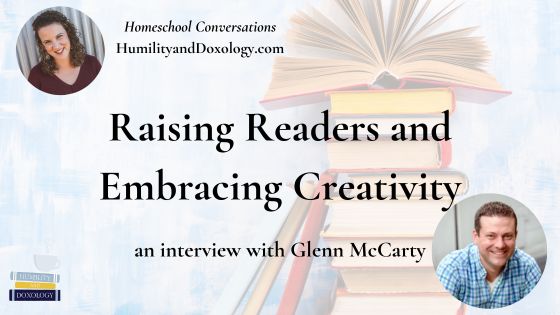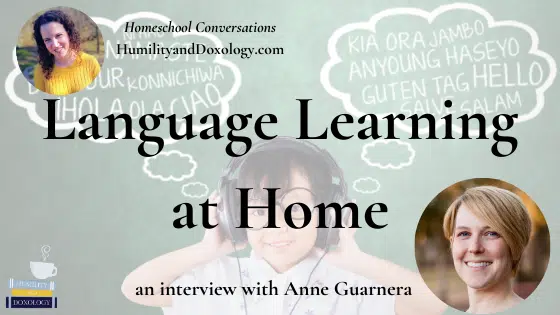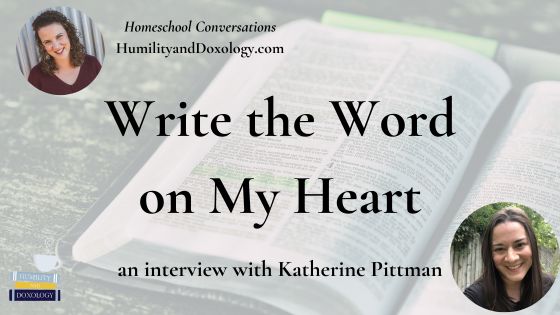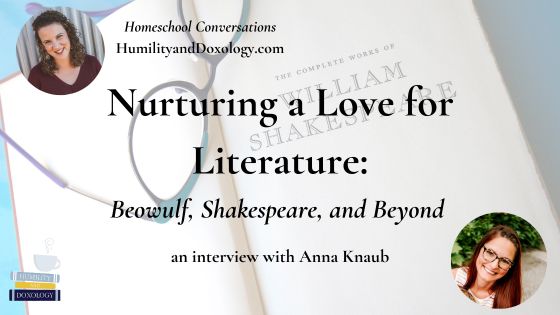In this episode of Homeschool Conversations with Humility and Doxology, Amy Sloan sits down with Glenn McCarty—author of The Misadventured Summer of Tumbleweed Thompson, Dead-Eye Dan, and a middle school English teacher—to discuss how families can nurture a love of reading, creativity, and shared stories at home. From the early days of toddler read-alouds to navigating the teen years, Glenn shares both heartfelt memories and practical encouragement for cultivating a vibrant literary and creative life.
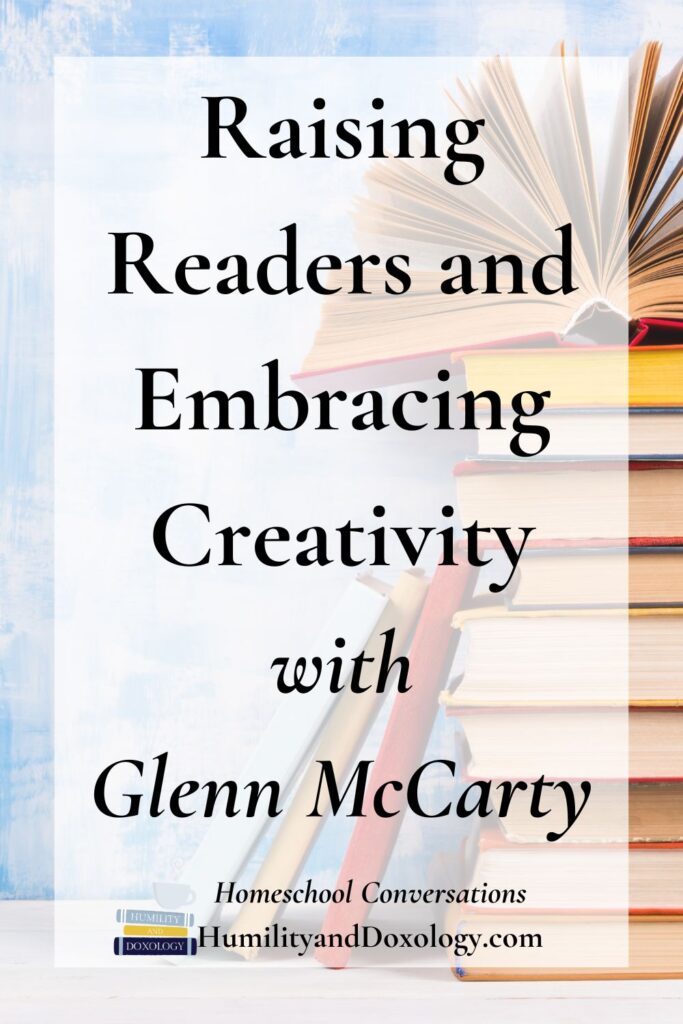
{This post contains paid links. Please see disclaimer.}
- Meet Glenn McCarty: Author, Educator, and Story Enthusiast
- The Books That Shaped a Young Storyteller
- Cultivating a Culture of Books at Home
- The Value of Read-Alouds
- When the Reading Culture Slows Down
- Reading with Teens
- Encouraging Creative Expression
- Making Books Enjoyable, Not a Chore
- Finding Delight in Shared Stories
- Glenn’s Own Favorite Reads and Influences
- Encouragement for Parents
- Key Takeaways
- Listen to the full podcast episode “Raising Readers and Embracing Creativity: A Conversation with Glenn McCarty" on Homeschool Conversations with Humility and Doxology
- Find Glenn McCarty online:
- You may also enjoy:
- Check out all the other interviews in my Homeschool Conversations series!
Meet Glenn McCarty: Author, Educator, and Story Enthusiast
Glenn McCarty is a middle school English teacher, storyteller, and the author of The Misadventured Summer of Tumbleweed Thompson and the Dead-Eye Dan novels. He lives in a small town in Western New York with his wife and two teenage sons, where they embrace adventure whenever possible—whether hiking, swimming, or road-tripping as a family. A lifelong lover of books and the outdoors, Glenn also enjoys campfires, banjo music, and, as he readily admits, a good slice of pie (with coconut cream and strawberry rhubarb topping his list). His passion for storytelling is deeply rooted in his love for literature and his experiences as both a teacher and a father.
The Books That Shaped a Young Storyteller
Glenn’s love for stories began in childhood with books that made him feel warmly welcomed into their worlds. He recalls being captivated by The Mouse and the Motorcycle and Ralph S. Mouse, drawn to the imaginative yet heartfelt storytelling. He also cherishes Robert McCloskey’s Homer Price and Centerburg Tales, which he credits as early inspirations for his own Tumbleweed Thompson stories. Like many young readers, The Chronicles of Narnia left a lasting impression—especially The Voyage of the Dawn Treader, which sparked a lifelong yearning for adventure on the high seas.
His passion for storytelling deepened during college when he and his wife took a children’s literature class together. Revisiting classic picture books and middle-grade novels reminded him how profoundly stories shape young minds, reinforcing his conviction that writing for children is not just a joy but a calling. Through stories, children explore themes of bravery, sacrifice, and friendship—lessons that Glenn now seeks to pass on through his own work.
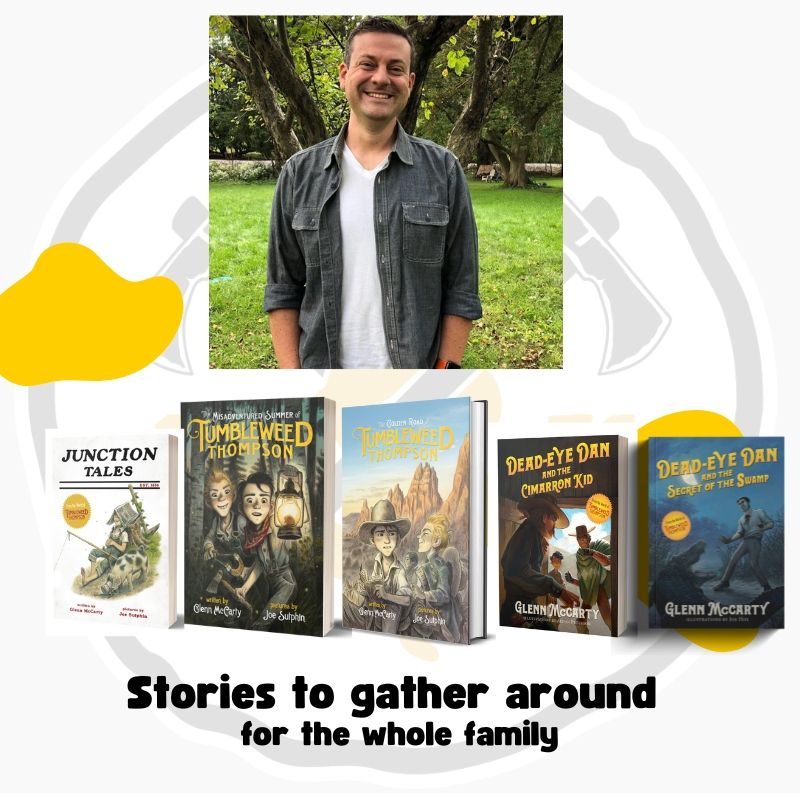
Cultivating a Culture of Books at Home
Books aren’t just tools—they can be part of the atmosphere. Glenn emphasized the power of physical presence: “If one of our kids would sort of trip or stumble and stick their hand out, there should be a book there.” For his family, that meant leaving books visible and accessible in every room, signaling that reading is not an occasional activity but part of the daily rhythm of life.
Glenn encourages parents to lead by example: “There’s this idea that if books are visible, if the act of reading is visible, then it’s going to be attractive.” It’s not just about what children are assigned to read; it’s about modeling curiosity, wonder, and delight in good stories.
The Value of Read-Alouds
Reading aloud wasn’t just a phase—it became a core tradition in Glenn’s household, evolving as his children grew older. He shared treasured memories of reading The Lord of the Rings together, even tearing up during the final chapters. “We had a good run where our whole family was in a book together, and I really cherish that time,” he said.
Even when schedules made it harder to read as a whole family, Glenn found ways to continue read-alouds one-on-one with his children, allowing for special moments of connection. Amy shared a similar experience in her own home, observing how individual read-alouds can carry deep meaning even when group reading becomes less frequent.
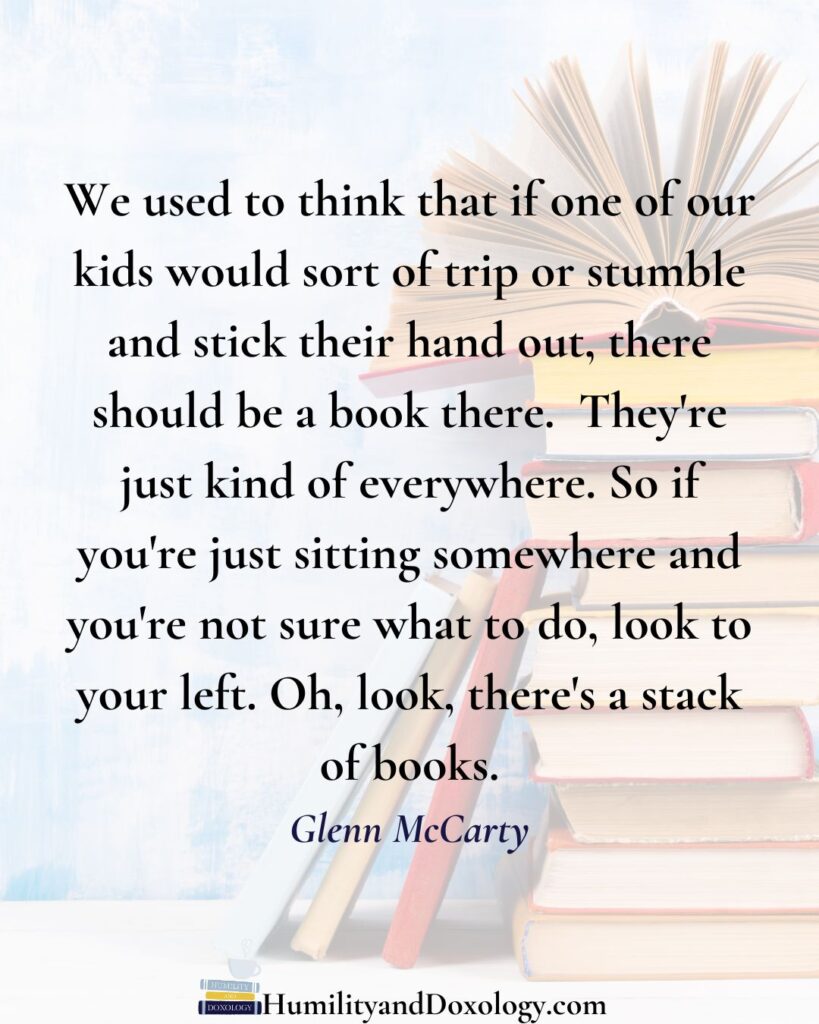
When the Reading Culture Slows Down
Amy asked how parents can continue to foster a reading culture even when things get busy or children become more independent in their reading habits. Glenn acknowledged that it’s okay for the rhythms to change, but that doesn’t mean the culture disappears. He emphasized the idea that reading together creates a shared language, a culture that lingers: “There’s something powerful about the stories you read together becoming part of the family culture, part of the shared language, the shared jokes, the shared memories.”
Reading with Teens
Even in the teen years, there’s value in maintaining a reading connection. Glenn recommended finding ways to connect with your teens through books by letting them take the lead—asking what they’re reading and why they like it. He stressed that teens still crave connection and that asking them about their books can open up space for meaningful conversations.
Encouraging Creative Expression
Glenn discussed the importance of giving children space to explore their own creative interests. He confessed that, early on, he sometimes imposed his own structure too rigidly. Over time, he learned to step back and observe: “Whether it’s the thing you want to write about or the type of medium you want to use… just kind of wait, observe, and see what’s happening here. Let’s not impose too early.”
Creativity flourishes in an environment of curiosity and freedom. Glenn encourages parents to nurture this by giving children time and tools without prescribing exactly what should be created.
Making Books Enjoyable, Not a Chore
Amy and Glenn discussed how to avoid turning reading into a burdensome task. Glenn believes that reading should be a joy, not just a school assignment: “It’s not just about getting through a book—it’s about the experience of sharing a story together.”
For families with reluctant readers, he recommended experimenting with different genres or formats, including audiobooks or graphic novels, and emphasized that reading aloud can continue to be a bonding experience at any age.
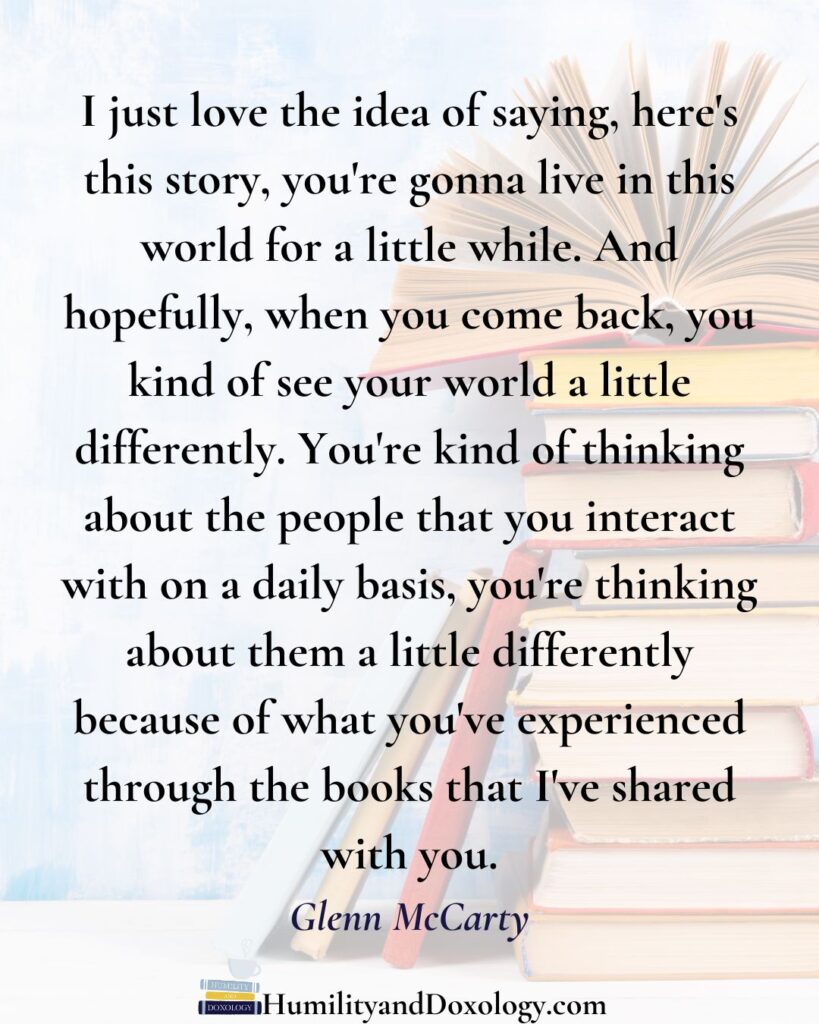
Finding Delight in Shared Stories
Glenn reflected on how stories shape family identity. Years later, kids still reference inside jokes and quotes from shared read-alouds. “Sometimes you don’t realize how deeply a story has embedded itself in your family until you hear a kid referencing it years later.”
These shared stories create a framework for connection, giving families a shared emotional language and a sense of continuity.
Glenn’s Own Favorite Reads and Influences
Glenn shared that he’s been deeply influenced by books like The Lord of the Rings, the Prydain Chronicles, and classic adventure tales. He’s also inspired by authors like G.K. Chesterton and C.S. Lewis. These stories have helped shape his own writing and family reading culture.
Encouragement for Parents
Glenn reminded parents that cultivating a love of books isn’t about perfection. It’s about intention, curiosity, and relationship. You don’t have to read aloud every night or have perfectly curated shelves. Simply let books be present, let stories be shared, and let wonder grow. “Reading aloud is such a great equalizer because we’re all in the same place in the story at the same time.”
Key Takeaways
- Surround Kids with Books – Having books physically present in the home encourages a culture of reading. Books should be within easy reach, making them a natural and unavoidable part of daily life.
- Read-Alouds Build Connection – Reading aloud as a family, even through the high school years, fosters deep emotional bonds and a shared love of stories.
- Read-Alouds Can Evolve Over Time – As children grow, family-wide read-alouds may become less frequent, but one-on-one reading can be just as special.
- Emotional Moments in Books Matter – Stories that move parents to tears (like The Lord of the Rings did for Glenn) leave lasting impressions on children and deepen their love for literature.
- Encourage Creativity by Observing – Instead of imposing rigid creative expectations, parents should watch, wait, and let kids explore their own interests.
- Avoid Over-Structuring Creativity – Glenn shares that his earlier attempts to direct creativity too much sometimes stifled his children’s natural expression.
- Let Kids Engage with Stories in Their Own Way – Whether through writing, illustrating, or storytelling, children should be given the freedom to respond to literature in ways that feel meaningful to them.
- Shared Literary Experiences Shape Family Culture – The books a family reads together become part of their shared language, jokes, and memories.
- Parents as Literary Role Models – Kids are more likely to develop a love for books when they see their parents reading and engaging with literature themselves.
- Reading Aloud Is for Everyone – Whether with young children or teenagers, reading aloud remains a powerful way to connect, learn, and enjoy stories together.
Listen to the full podcast episode “Raising Readers and Embracing Creativity: A Conversation with Glenn McCarty” on Homeschool Conversations with Humility and Doxology
Glenn McCarty is the author of the Tumbleweed Thompson Adventures, and the Dead-Eye Dan novels. He teaches middle school English in Western New York, where he lives with his wife and children in a small town that’s pretty much Mayberry. But without Don Knotts. Bummer. He finds campfires and banjo music two of life’s simple pleasures. And pie.

Find Glenn McCarty online:
You may also enjoy:
- Joe Sutphin and Kevan Chandler on Friendship, Faith, and Creativity
- The Joy of Writing: Millie Florence and Beyond Mulberry Glen
- Stories and Sanctified Imaginations (with S. D. Smith)
- Picture Books, Read Alouds, & the Power of Shared Stories with Sarah Mackenzie
- Reading, Relationships, and Restfully Homeschooling (with Sarah Mackenzie)
- Traitor: an interview with author Amanda McCrina
Check out all the other interviews in my Homeschool Conversations series!
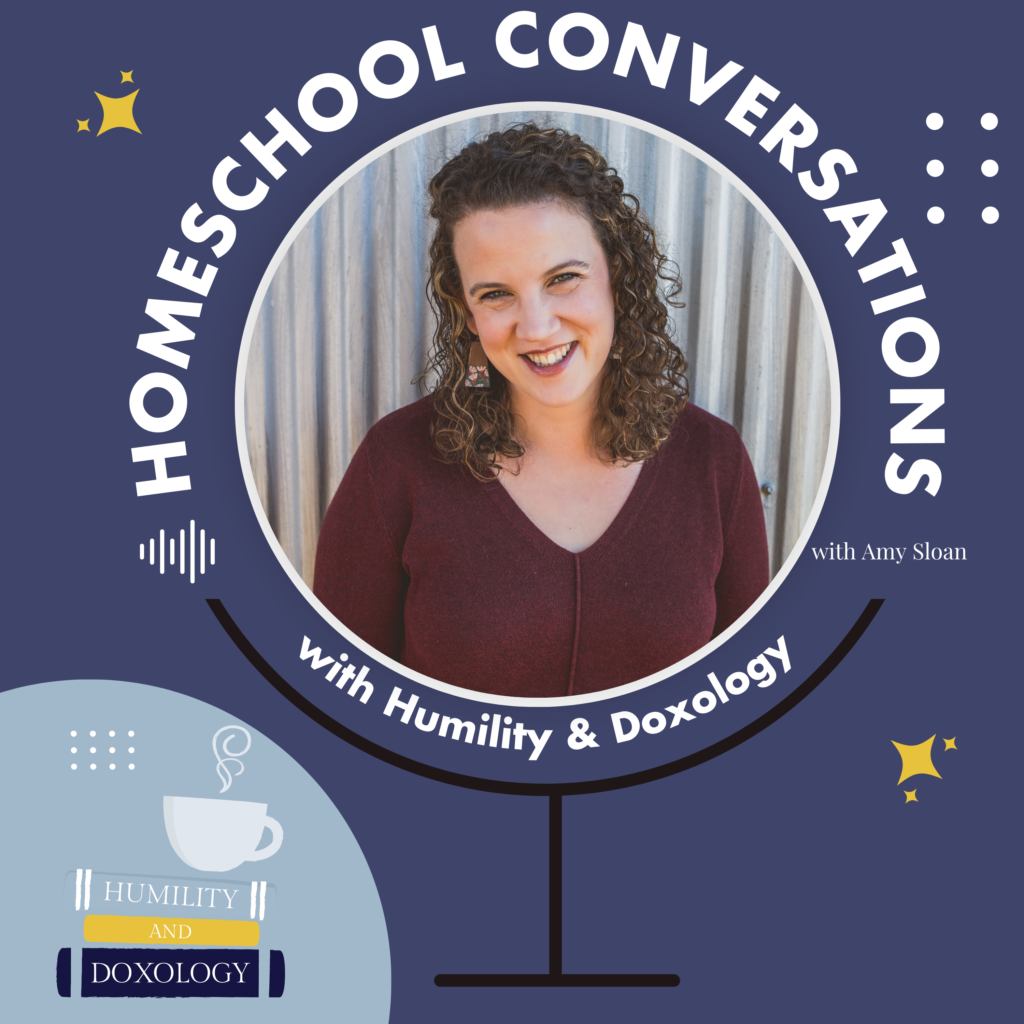
Amy Sloan: Hello friends. Today I am delighted to be joined by Glenn McCarty. You may know him as the author of the Tumbleweed Thompson adventures and the Dead Eye Dan novels. He teaches middle school English in Western New York, where he lives with his wife and children in a small town that’s pretty much Mayberry. You may not realize I live in North Carolina, quite close to the town Mayberry is based on, but unfortunately Don Knotts does not live near Glenn. He finds campfires and banjo music two of life’s simple pleasures and pie. So Glenn, would you just tell us here, there’s like the official bio and introduction, tell us a little bit about yourself and your family.
Glenn McCarty: Well I have two boys who are now 16 and 14 and my wife and I both are teachers and I’ve been an educator for over 20 years. I was briefly a journalist right after college, but ever since that I’ve been teaching high school, middle school English and writing and a whole bunch of other things. And we are definitely fortunate that despite the fact that some of the year here in Western New York, it is kind of like it is today, which is about 10 degrees for a lot of the year, summer and fall, it’s great to be outdoors. And so we have definitely taken advantage of the fact that we both as teachers have the summers off and have tried in the summers just to kind of do as many outdoor rambling, going around adventures, hiking and being in creeks and swimming and taking some family road trips. And we just, we’ve always as families been blessed to have some great adventures together where we can, like this summer for example, our family road trip took us right through probably your part of North Carolina because we went to Mount Airy, North Carolina. And sometimes with adventures we’ve had some, you know, some unexpected developments, but I would have to say that we play games together and definitely have a lot of laughing and a lot of good memories that we’ve made over the years. And I’m a reader, I love reading and I think, and you mentioned Pi in the official bio, but I feel like I have to have to just echo that because it’s one of life’s pleasures.
Amy Sloan: Yeah, well I have to ask if you have a particular favorite Pie.
Glenn McCarty: Oh man, I often answer coconut cream to that, which is sort of like, you know, not one of the classic pies, but I do love strawberry rhubarb as well.
Amy Sloan: Okay, well I have to, you know, share a little dad joke humor. This is from my dad. We’re from the South, so not really so much now, but when I’m with my extended family, definitely the accent comes out. And so if you’re ever with Southerners, you can say, why is my hand like a lemon pie? Because it’s got meringue on it. So there’s your little Pie humor.
Glenn McCarty: I love it. That’s so great.
Amy Sloan: Okay, so you mentioned you love to read and of course you are a storyteller and author yourself. I would love to hear your sort of history with reading, your storytelling past. You know, is that something that always captured your imagination as a child? Was there a particular book that originally kind of set you on this path of reading and telling stories?
Glenn McCarty: I’ve always been a reader and I think I’ve always been drawn to stories that were, I want to say like warm and inviting. There was either a narrator, you know, it was a first person story or even, I mean like there was a narrator who was a character or even a third person narrator who just kind of in the early part of the story, you were just kind of, you’re made to feel welcome in whatever world it was. And I think that had a lot probably to do with the main character being someone that I just felt like I could really connect with. And I think going back almost all the way back to like middle elementary, you know, like third grade, fourth grade, there were always books that I remember just making me feel that way. I think The Mouse and the Motorcycle and Ralph S. Mouse was one that just captivated me. I don’t even really know exactly if, I don’t really want to analyze that too much because it was just, it was such a delightful book with just enough imagination, but really you cared so much for this little mouse. And I always loved the Homer Price, Centerburg Tales books by Robert McCloskey, which were very small town boy adventure. I think they were sort of ancestors of the Tumbleweed Thompson books for sure in the sense that they created this community and they gave this main character a chance to kind of like explore and become his own person through the process of some of the decisions that he was having to make and sort of stepping a little bit outside of the boundaries that existed. And Narnia, of course, I mean, I know for a lot of people the Narnia books were that way. They were so just vividly rendered and captivating in the way that they presented the world, especially The Lion, the Witch, and the Wardrobe, but so many of them. I think the Dawn Treader book for me, which is probably my favorite of that series, was one that I just remember like that. I mean, like I’ve never been on a sailing ship, but I think that that book will for the rest of my life make me want to, you know, be on a sailing ship, have these adventures, go to these islands. And I think, excuse me, I do think that, you know, as I was talking about storytelling, I think as I was, you know, younger and then thinking about writing, that was always something that I just wanted to try to sort of like mimic it, you know, in the same way that you’re trying to like try on your dad’s shirt or your dad’s shoes or something, you know, like you just want to see what it fits like on you. And so it was always something that was just, I wanted to do it. And I think, you know, I got busy in high school, but I remember my senior year of college, my wife and I, she was an elementary education major and I was an English major. We both took a children’s literature class together. And so there I was probably like 20, 21 years old. And I remember our professor was so great at like bringing out picture books and middle grade books, things that I hadn’t thought about or seen in a long time. And especially as like an English major of literature, you know, I sort of moved into this other territory where you were talking about these really deep, complicated things. And then I remember just that was such an inviting experience to think that telling stories for young people was not only worthwhile, it was a very validating experience to take that class with him. But also I just was reminded of how like foundational and how your imagination is formed by the stories that you read when you’re a young person. And that was probably the first big step in this idea of, I think I want to try to write novels for young people. Because I just knew as I looked back on my experiences when I was a kid that there was just so much foundational exposure to beauty and truth and all these great thematic things, you know, hard choices and sacrifice and friendship and forgiveness and bravery and all those things that you’re getting to explore as a kid by reading these great books. I think definitely it was like, I think I want to do this. Not just I want to do it, but I feel like this is a really big calling, you know, that someone can have.
Amy Sloan: Well, all of those books you mentioned that kind of captured your heart as a kid, Narnia, the Beverly Cleary books, you know, Homer Price, they’re these deceptively simple stories on the one hand with such rich themes and ideas, right? That’s why they’ve stood the test of time. I think about some family read-alouds we have enjoyed as a family, like Half Magic by Edward Eager. I don’t know if you’re familiar with that one. But we read that one for the first time aloud as a family, and it’s this very kind of crazy, kooky story, right? And then we finished it and I said to my husband, I said, John, that book is really asking one of the big questions, like what is a good life? Like that’s the theme of that book. Or, you know, The Rats of NIMH, it’s like what does it mean to be a good man? I mean, a good rat, but really it’s about what it means to be a good man, right? And so you’re never too old to read a great book. And sometimes I kind of like the children’s books better, maybe. That’s just me.
Glenn McCarty: I think there’s, when you talk about deceptively simple, I think there’s, for me, what I’ve tried to do is create an opening, but also create a situation or a scenario that is very easy to get into, like to kind of step into that world without a lot of difficulty for a kid, you know, like, you know, the mouse and the motorcycle, like here’s, you know, here’s like a kid and here’s a motel and here’s a mouse. And like, okay, you know, I’m there, right? Like, I don’t need a lot of, you know, it just doesn’t require a lot. And that’s very, I think that’s very welcoming and very hospitable to readers, to young readers especially, that getting into the story happens so naturally. And then once you’re connected to a character and you’re sort of traveling that path with them, you know, you’re experiencing all the things that they’re experiencing, the horror of something breaking or something falling apart or even loss, you know. I can’t believe I didn’t mention Where the Red Fern Grows, which was a huge book for me. And in fifth grade, our teacher read it aloud to us. And my wife actually in sixth grade, they read it, and she just finished that unit with her sixth graders. And so she still every year experiences that story. And I think, again, that it’s, you know, there’s nothing very complicated about the premise to that book. I mean, it’s basically growing up and learning to love and go through life with these two amazing dogs, you know. Like, you’re there, okay. But it’s what you do with that that can really be so instrumental in shaping someone’s imagination, you know. Yeah, definitely.
Amy Sloan: Oh, I still remember sobbing when I read that book for the first time as a child. It was in public. It was in the Realtor’s office. My parents were there, and I was like bawling uncontrollably. It was so embarrassing. Yeah. But that’s what a good story will do, right? Yeah. Well, can you tell us a little bit more about your own journey as a writer?
Glenn McCarty: Yeah. So the Tumbleweed Thompson books, about 10 or 11 years ago, this is sometimes, you know, we’re talking about premises. Sometimes I’ve had other ideas for books that have never been published. They’re just sort of unfinished manuscripts or unpublished manuscripts that the premise took a lot of sort of digging and discovery. And really, I still don’t exactly know, remember exactly what, but I do know that the name, Tumbleweed Thompson, just sort of popped into my head. And then it sort of became some sort of, okay, I think it’s going to be an Old West story. Because I loved Tom Sawyer and Huck Finn as a kid. I didn’t mention those either. We could do a whole podcast about just like, you know, formative books, I think. But, and then it was just some questions, you know, like what kind of kid would call himself Tumbleweed, like would give himself that nickname, right? And then it began, like I said, I had written a couple other manuscripts for young people that had been sort of submitted and gone through the process of publication, sending out to various people, and nothing had really come of them. And I think I sort of acknowledged that they weren’t sort of where they needed to be. But Tumbleweed Thompson and Story Warren, the publisher, their stories have been together since the very beginning. All those years ago, it began as just a series of short stories that were published on the Story Warren website. And, you know, very episodic, which to me was very great. That’s what I loved about like the Homer Price books is, you know, they weren’t necessarily one novel length plot. They were just a bunch of little vignettes in the life of Homer, you know, and so I envisioned it as, you know, they were happening consecutively, but they were just sort of several vignettes in the life of Eugene Appleton, the main character of the book, and this new kid that comes into his town and kind of turns his life upside down, who calls himself Tumbleweed Thompson. And I had written several of those. And then S.D. Smith, Sam Smith, and I were talking about it. And he said, I think you really should turn this into a Tumbleweed Thompson novel. And one thing led to another. And it didn’t take that much editing for it to kind of move from a series of vignettes to still maintaining that spirit. That first Tumbleweed Thompson book, The Misadventured Summer of Tumbleweed Thompson, does have that sort of vignette episodic spirit, but kind of woven through it is is this, you know, this sort of bigger, more significant, higher stakes plot, which involves some shady characters in town. And I think, you know, once that Tumbleweed Thompson book existed, for me, I was super excited to kind of see what other stories I could tell from the world of Tumbleweed Thompson. And so that’s where the Junction Tales collection came from. It was me, you know, kind of like, okay, if Rattlesnake Junction, where this story takes place, is kind of like my Mayberry, you know, like, what about, like, what do we know about about the guys who hang out in the barbershop on Saturday morning? Like, what kind of stories are they telling around, you know, just on a Saturday morning when they’re sitting around chewing the fat? Or what about that place outside town they call Mosquito Ridge? Like, where’d it get its name? You know, like, the kinds of things that if you’re growing up in Rattlesnake Junction, you might have heard a story about that guy who has that herd of cattle, you know? And all the other books, the Dead Eye Dan books that you mentioned in Junction Tales, have sort of just sprung out of the desire to just build this world that hopefully, you know, kids who read the Tumbleweed Thompson books, you know, kind of are drawn to the other stories. Because in spirit, they’re similar, but they’re maybe telling other corners of that world. Yeah.
Amy Sloan: That is, sounds really fun and just an adventure. And it makes me think of a word you used earlier, where you talked about, like, wanting these to be hospitable places, you know, books that you remember reading that made you feel welcome as a child. And I can kind of hear that as you’re describing what the way you want to write for children. I’m wondering if we can maybe go a little deeper and tell me what it is that you like about specifically writing stories for young people, or what it is you hope to do as an author with that audience.
Glenn McCarty: Yeah, I think for me, stories for young people, there’s a willingness and a spirit of openness, I think, when I think about when my own boys were in that 10, 11, 12 age group. I mean, even now, they’re a little bit older than that. But there’s an openness to once you’re into that world, into that book of accepting and following. And there’s such an openness to new ideas and new horizons. I know adventure, the kind of stories I can tell often are adventure stories. And I know that for young people, you know, new places, you know, new, new experiences, reading about those in books is just the best. I mean, I mentioned Dawn Treader, you know, like, I think I, so many different books that I read that were that age, that when I was that age, specifically, were just exposing me to all these new places, real, fictitious, who knows if they even existed in my world, right? But just, it broadens what you see of the world. And that’s happening, you know, in your inner life to when you’re that age, you know, your, your conception of a lot of things is getting more complex and more, more nuanced, you know, you’re starting to ask some questions about some things that you maybe took for granted when you were a little bit younger. And I think that combination of what’s happening as you’re sort of seeing the world, you know, I just love the idea of coming alongside a child and their family and saying, here’s things that you’re already thinking about, here’s questions you’re already asking, you know, let me just, you know, let me just kind of provide, let me just help you with that a little bit. You know, here’s, here’s something to think about, right? And I love, you know, like some kind of those, those sort of ethical questions in the first Tumbleweed book. You know, there’s, there’s several different questions that are asked of Eugene, the main character, sort of through his relationship with the town barber, Wendell, where he, he’s maybe not for the first time, but he’s having to really think deeply about, you know, loyalty and how far, you know, when you’re loyal to someone and you believe in them, how far you’re willing to go, you know, to kind of help that person out. And that kind of is juxtaposed with, with Tumbleweed, who’s kind of a rambler and has never really had that kind of loyalty. And so, you know, I just love the idea of saying, here’s this story, you’re gonna, you’re gonna live in this world for a little while. And hopefully, when you come back, you kind of see your world a little differently. You know, you’re kind of thinking about the people that you interact with on a daily basis, you’re kind of just thinking about them a little differently because of what, what you’ve experienced through the books that I’ve shared with you.
Amy Sloan: Well, there you’re talking about really big, meaningful themes and ideas that you’re approaching in your book, or in kind of causing children to think, or young people to think about a little differently. How do you balance also the humor and the fun? How do you kind of find that balance of humor and meaningful, deep themes in your writing?
Glenn McCarty: Boy, that, Amy, that is me. Like, those, that is like, that’s just kind of where I live all the time is like, I’m gonna, maybe like, better for worse, right? I’m gonna maybe have some thought that I’m like, wow, and then I’ll get up and like, stub my toe on something, right? I’m just laughing at myself, four seconds after I just had this thought that I’m like, I want, you know, like, I don’t know me, humor is just something that I feel like is very authentic. I, I’ve always kind of seen the world as a little bit of a comedy in the sense that like, just bizarre things are happening that you can’t really explain. And I mean, you know, I teach middle school, I teach eighth grade. So like, bizarre things are often happening. But I think for me, humor isn’t some sort of strategy as much as it is just kind of like a natural reflection of kind of what I see going on. Plus, I love reading and experiencing comedy and humor. I love stories that are funny or movies or television shows or whatever. Um, even to the point of a little bit of the like, silly, bizarre type humor. Um, but, um, so I think I, I want that to be a part of, you know, of the stories that I tell. I do also know that, like you mentioned, writing for young people, you know, they love to laugh. I mean, you know, like, there’s, there’s a silliness. Um, I think silliness is very, very important. I take silliness very seriously.
Amy Sloan: I love that. It actually makes me think of that, um, GK Chesterton quote. I’m going to paraphrase it. Uh, this is the message translation, but it’s something like angels are able to fly because they take themselves lightly. Um, and I think sometimes we can take ourselves a little too seriously, especially, you know, those of us who like to think deep thoughts and, and there’s maturity, but sometimes we can equate like maturity with just never cracking a smile or stuff, you know, like there is a sense in which, like you said, humor is a serious matter.
Glenn McCarty: Silliness can, can also be serious. And that was a turning point, I think, as a parent. Um, I don’t know, I don’t know exactly where, you know, I kind of picked up the idea that when I first was a dad that my, my, what was expected of me was to be sort of some sort of like Mount Rushmore type marble person, you know, and I just kind of like, this was how I dispensed wisdom. And then, um, I was very fortunate early on in my parenting. I’ll never forget, actually, I’ll give credit to these two gentlemen who are, who are both funny, wise men. Um, I went to a conference, the Hutch Moot conference, which is through the rabbit room. Um, one of my kids were very little. And I went to a little workshop panel with Randall, good game, um, from slugs and bugs and SD Smith. And it was about being a dad and they both as leaders of the workshop could have talked about parenting and being a father. And they both told stories that were both really funny and kind of embarrassing and self-deprecating about times that they had just kind of messed up as a dad. Um, and I just, I remember coming away from that being very impressed by them as guys, but also thinking, you know, wow, like I can kind of just laugh at myself and we as a family can laugh together. And it just took me right down off that pedestal as a parent. Um, and it’s, it has become such a part of our family culture, um, humor and laughing together and looking back at, you know, things we’ve gone through stories and laughing at those. I think, um, I’m, I’m very grateful to have been given permission as a parent, um, to make laughter a part of our home.
Amy Sloan: It’s almost like I’m seeing a connection between humor and humility. Yeah. Well, what are some ways that a family can really nourish a culture of stories in, in their home, in our home?
Glenn McCarty: Um, you said nurture a culture of books, right? Yeah. Okay. Yeah. A little like glitch or something there. Um, I think probably the, you know, I think your, your listeners are, are going to be amazing, literate, wonderful, earnest, creative people. And so I’m feeling a little like what I’m going to say is, is not going to be much help
Amy Sloan: because I remember what Paul said. He was like, it’s no trouble for me to say it again and you need to hear it again. So that’s how I feel. Remind us of what we know.
Glenn McCarty: Yeah, for sure. I think culture of books. Um, I mean, obviously presence is very important, like, like literal, literal having them right. Um, everywhere. Um, you know, like we used to think that if, if one of our kids would sort of like trip or stumble and stick their hand out, they should, they should like physically, there should be a book there. Right. Like it’s just, they’re just kind of everywhere. So if you’re just kind of sitting somewhere and you’re not sure what to do, look to your left. Oh, look, there’s a stack of books. Um, you know, let me see if one of those looks interesting. Right. Um, we also, um, you know, read alouds were huge for us. I think I was so excited that from the very beginning day, literally day one, all the way up until, you know, probably I’m, I’m not going to lie. My older son’s a junior, halfway through his junior year of high school. I mean, we, we don’t really do read alouds with them anymore. Um, but we, we had a, just a constant, you know, like I was already thinking when we were in the middle of one of our evening read alouds, um, what’s the next thing going to be, what’s the next thing going to be and trying to find a way to sort of like, um, try to, it’s hard to say, try to communicate that in experiencing some of these books together, we as a family and them as individuals, we’re all kind of stepping into this grand tradition of this particular, um, book, you know, like we’re joining the people who have also experienced this story. And so it feels, it feels very significant, you know, like, oh my gosh, this is cool. I get to, I get to experience, um, Charlotte’s Web or I get to experience, um, you know, whatever. I think that, that experience of us kind of doing them together as read alouds was, was really great. Um, and you know, like family road trips, there was always audio books. Um, and you know, I think again, like doing voices, you know, like, um, the attempt, right. I mean, like it’s a shared experience. And I think when you’re trying to create a family culture of anything, fill in the blank, I think having that shared experience, um, is so powerful. Um, when, when we’re all sort of together doing this thing, right. And even now, I mean, you know, there’s definitely times where I mentioned, we don’t, we don’t kind of do the evening read aloud together. Um, we’re still, you know, like the four of us will be in the same room all reading something, you know, and, uh, you know, I think, I think for us that kind of togetherness, um, has meant that, you know, we can refer back to that, that book that we were listening to on that trip or that time we did that read aloud, you know.
Amy Sloan: Yeah. I have those memories from my own childhood and I enjoyed so much those shared audiobooks on car trips as a family or just, you know, even back when all my kids were little and I would be driving, you know, everyone was together when you’d go to one person’s, you know, class or, or another activity because no one was young, old enough to stay home alone. And so we were able to share so many stories together all the time. And it’s gotten a lot trickier now. I have five children and by the time this airs, they’ll probably be from like 10 to 20. So, uh, a big age range. And of course those older ones are independent like your, like your teens, you know, they have activities and other things. It just makes it logistically harder to all be together. Um, but over the past year, uh, my husband has actually, I, I, you know, do a lot of reading with the kids as part of our school stuff, but, um, my husband has taken the opportunity to just have a read aloud book that he does with individual children. So it’s different from when we all used to be together. That’s just not feasible a lot of the time right now, but he’ll take one-on-one time with a child and they’re each reading a different book. And I thought, you know, for a while I was kind of grieving the loss of that regular family, all seven of us together read aloud time, but there’s something really special about that kind of unique one-on- one experience they’re sharing together as well. So definitely. Yeah. Well, do you have a favorite particular memory from a read aloud with your family back or an audio book? You know, that’s kind of a read aloud.
Glenn McCarty: Yeah. Um, so the first one that comes to mind is going to fit within this theme of like sort of a little self-deprecating. There was one year and I don’t remember how old my kids were at the time. Um, there was one year where we decided, I decided we talked about in advance that this coming calendar year was going to be the year of Lord of the Rings. Um, and so we started probably January 1st, I would say. Um, and we read Fellowship of the Ring. I mean, actually, I think it was literally like one of those giant three in one volumes. Um, we finished that one, went on to Two Towers, finished that one, went on to Return of the King. Um, and, you know, aside from just the accomplishment factor, it was, it was amazing, right? I think my older son had read some of this trilogy. I’m not sure he had read. I think he had maybe gotten into the second book. I’m not really sure. Anyway, um, that was a fantastic memory. Um, the, the boys like to tease me about the fact that when we got to the very end of Return of the King and I was reading about the Grey Havens, um, that I had to sort of stop because I was like, you know, getting emotional, tearing up, even to the point of like crying and unable to read, uh, for just the beauty of what he’s describing there at the end. Um, that, uh, you know, they were, they just like to tease me about how daddy couldn’t get through the end of Return of the King without crying. Um, but there is really, I mean, there’s really something about like reading something aloud that changes your experience of it than just if you’re reading it quietly, you know, it’s just hard to say you slow down the way you interact with stuff changes. Um, it’s like, it is kind of a different experience for reading it to yourself. If you’re reading aloud, especially if you’re reading aloud with other, with like people you love and then people who love you haven’t read it before. And then when you’re like, there are such amazing things in this, I just, I’m so glad I get to share this with you. I think all of that was happening and I was just, I’m sort of prone to being emotional anyway. So like all that was happening and it was just like, it was too much. There are some books like that
Amy Sloan: Like if you haven’t had a book where you have to like pass it back and forth from parent to parent to try to get through the hard part, you know, have you really been a reader yet? That’s right. Good question. Well, what is a piece of advice you would give to parents maybe whose children they’re wanting to inspire them with creativity? Maybe they’re, they’re interested in writing or they think, oh, I think I would love to inspire this sort of creative thinking. Do you have any advice for those parents?
Glenn McCarty: I think one thing that I hopefully have gotten better at is just kind of meeting your children where they are in terms of their interests and their path. And that’s, that’s a tricky balance, but I think I’m a very deliberate kind of person, educator, you know, like have a curriculum plan and all those things. And so I think there were many times where I, especially maybe my wife as well, but probably me, both of us were sort of like very much like curriculum focused when it came to like creative pursuits that sort of existed outside of the curriculum. And so we had an agenda and a plan and sometimes that made for, you know, like tension and sometimes it made for like the sort of shutting down of creativity. And so I think we tried as we learned from some of those experiences and we kind of just said, whether it’s the thing you want to write about or the type of medium you want to use, or even like the way you want to go about doing it, just kind of like waiting, observing, let’s see what’s happening here. Let’s, let’s just, let’s not impose too early. Let’s just kind of let this organically happen. And just kind of, I mean, and that’s, it’s so ironic because I think for me, I mentioned earlier that like, when I was in college, I felt sort of funneled towards a certain kind of literature. And I was, I was a little frustrated that there wasn’t as much openness or acceptance to like writing for kids or anything like that. Right. That I kind of made almost, I wouldn’t say I made the same mistake, but you know, I kind of maybe shut down some creativity because I wasn’t just sort of meeting someone where they were, meeting one of my kids where they were and saying, oh, that’s really cool. That thing that you’re doing. Let’s, let’s sort of see how we can kind of maybe like explore that more and see how we can, I guess it’s like nurturing versus like controlling or something, you know.
Amy Sloan: It’s kind of like when I would, I remember when my kids were young and we would go to like one of the craft activities at the library, right. And there’d be some art project, some very creative art projects that the facilitator had, had decided was going to be the craft project. And so I would just sit there and I’d let my kids like do it, you know, it didn’t look real good. I was just going to throw it away later. Don’t tell them that, you know, but you know, I just sort of let them follow this. And then you would see the parents that were just like, no, no, that’s not where the little googly eye goes. The googly eye goes here. Here, just let me glue it, you know, and just basically making this perfect product for their child and not giving the child just a freedom. It was a directed freedom, I guess. But that ability, that space to just try something and maybe even be bad at it, which kind of comes too with just like time and space as well. I think if everything’s filled, there’s no time to explore. And make mistakes and all that.
Glenn McCarty: I mean, creativity is messy. I mean,literally, metaphorically, it’s, you know, it’s going to involve a lot of stops and starts and changes of plans and all that stuff. And I think, you know, that’s easier said than done, especially when, you know, there’s factors that you’re sort of like, oh my gosh, time, and oh my gosh, this. But yeah.
Amy Sloan: Yeah. Well, I just give my kids a lot of tape and cardboard and like, there you go. Oh my gosh. I’m not really a hands-on creative mom, but I’m very much, hey, feel free to use the tape and the cardboard and throw it away when you’re done. Yeah.
Glenn McCarty: Well, hey, materials. You can’t make anything without materials, so it’s important. Yeah.
Amy Sloan: Well, this has been a great conversation. I can’t wait to share it with the listeners and viewers. But here at the end, I want to ask you the questions that I’m asking all my guests this season. And so the first is just, what are you personally reading right now?
Glenn McCarty: I am personally reading, we talked about sharing books together. I’m actually reading a fantasy book that my 16-year-old recommended to me. It’s by James Inslington, Australian fantasy writer. And he’s the author of a book called The Will of the Many. But this is his previous trilogy, and it’s the first book in that series. And I believe it’s called The Shadow of What Was Lost. He’s very inspired by Brandon Sanderson. And I don’t read a lot of high fantasy. It’s probably the one major genre that I don’t just instantly go to. And so my son just was rereading this trilogy, and the books are each like 700 pages. And he was engrossed for a second time. And so I just thought, you know what, if he loves this series so much, I got to get in there and see what this is all about. And it’s enjoyable. I’m really enjoying it. But yeah, that’s where I’m at right now.
Amy Sloan: I will have to look that one up for my teens. They enjoy Brandon Sanderson and some of those, you know, epic fantasy books. So it sounds like it would be up their alley for sure. Well, what would be your best tip for a family, maybe a day seems to be going all wrong. What would be your best tip for turning around a bad day?
Glenn McCarty: I think I would probably say talking about like acknowledging it, like talking about the elephant in the room. I think, I don’t know, I feel like I’m sort of like maybe I’m trying to fit themes together here. But this idea like we were talking about, like controlling versus organic, allowing creativity to happen. I think just sort of like acknowledging that things are not going as planned. And I think activity sometimes can be a way like whether that’s dancing, music, like changing the atmosphere of the room, sometimes can do that, you know, whether it’s, like I said, putting on music or something like that. I think, you know, changing the atmosphere of the room, like trying to find a way to acknowledge this is happening. We’re not, you know, we’re all whatever. We all woke up in a bad mood. We know like somebody did something and I can’t let it go, whatever. But I think like changing the dynamic sometimes can be a way or even like, you know, activity. I mean, like trying to find something to get involved in that can sort of take your mind off of things. And I mean, of course, laughter, but you can’t, you can’t always summon, you know, you can’t always summon laughter at a drop of a hat, you know. But I think anytime that we’re laughing, something about our, we talked about humility, you and I talked about humility, but it also just sort of lets down our defenses a little bit. And I think, you know, sometimes that can be something that’s in the way of harmony, you know, family togetherness is like that sort of defensive or that pride or whatever it is, you know. Even if you’ve been hurt by someone, if someone did something or said something that really bothered you and it was in the morning, but not the afternoon, and you’re still not letting go of it, you know, if there’s a way to just, you know, like humor can do that. It can kind of lower everything, just lower the tension, you know. Yeah, for sure.
Amy Sloan: I think that’s so, such good advice, just to acknowledge it, to say, like, sometimes I’m like, mom is really having a bad day. Like, I, maybe I didn’t sleep well, or, you know, there’s some really hard things going on and I am just really struggling. Like, acknowledging that to our children, again, we’re connecting it, it’s kind of like humility again, right? But it’s, it’s giving them also the, the freedom to share their own thoughts and feelings, like if they’re having a hard day, and it doesn’t excuse them, you know, being grumpy with each other. But it kind of enables us to be like, hey, this is part of the human experience, and what can we do to get past this? And that’s really, really good advice.
Glenn McCarty: Yeah, just not feeling like everything has to be buttoned up all the time, you know. And I found that, that, like you just said, that, that sentence, sort of like confessing that there’s been times where there’s been such powerful sympathy from my kids, like, they’ll just sort of, you know, kind of like walk up and put a little hand on my shoulder. And, and I’m just like, oh, my gosh, like, that was everything. Like just admitting, oh, man, like, I, you know, like, I’m gonna say it, I’m gonna say that I’m not in a good place right now. And just instantly, they’re, they’ve been so willing to, that’s okay. It’s all right. Like, you know, because I think we all admit, we all are like that, but we don’t always bring it up to the forefront, you know. We just kind of like, okay, let’s get through this, let’s get past this, you know.
Amy Sloan: Yeah. Our pastor recently preached on Psalm 139, and I think the title of the sermon was An Invitation to be Known. Because, of course, in there, the psalmist is talking about how God knows him before he even, like, says the words, right, truly known. And our pastor, you know, was just reminding us that the Lord knows us, and that’s also why we can truly be known by one another, right. We don’t have to be hidden or have that facade. And where better to start that than with our children and our families, for sure.
Glenn McCarty: It sets a really, like you said, it sets a really powerful precedent, like, it’s okay to, it’s okay to do this, you know. And you’re modeling that sort of openness and vulnerability that you sort of, we always are saying we want that, we want that in other people, but like, okay, I’ve got to go first, you know, sometimes, right.
Amy Sloan: Well, Glenn, where can people find you and your books all around the internet?
Glenn McCarty: Yeah, so, I mean, my name, Glenn McCarty, glennwithtwoends.com is a great place to start. There’s links to the books and a little bit more about them. You can sign up for my email newsletter there, where every so often you just kind of get a little bit of what’s going on with my book projects. And the Tom Boyd Thompson books are available at the Story Warning Store, and the other ones are Amazon, you know.
Amy Sloan: Yeah, and I will have links to your books and your website, all those things, and the show notes for this episode at humilityanddoxology.com. I encourage you guys to check out his book, check out Glenn’s website, and tell a friend about this episode that you think they would enjoy. Leave a rating and review if you’re listening in your podcast player, or subscribe if you’re watching on YouTube, and I look forward to chatting with you and I look forward to chatting with you again.

